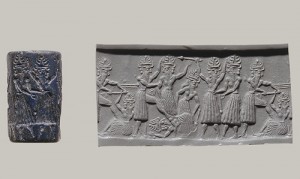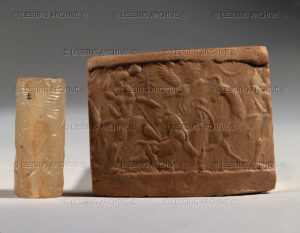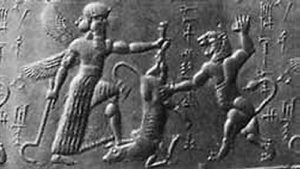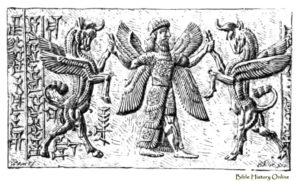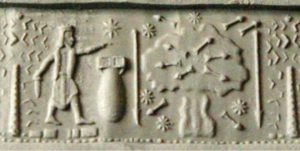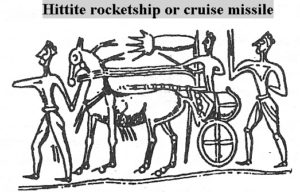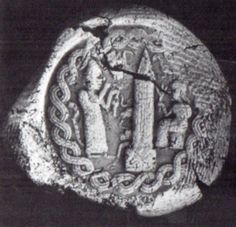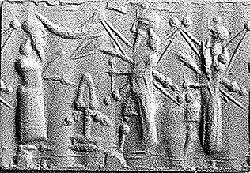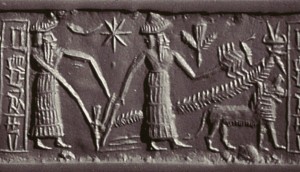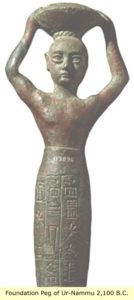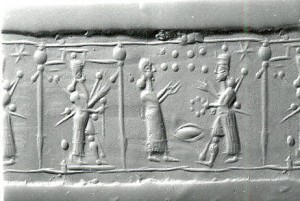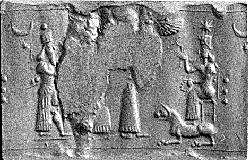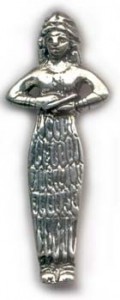Source: Black, J.A., Cunningham, G., Robson, E., and Zólyomi, G., The Electronic Text Corpus of Sumerian Literature, Oxford 1998-.
(Texts: All Artifacts, Color Coding, & Writings in Bold Type With Italics Inside Parenthesis, are Added by Editor R. Brown, not the Authors, Translators, or Publishers!)or!)
(gods in blue)
Myth also known as “Lugal-e” or “Oh Warrior King!”. In it, Ninurta is feasting with the other gods, when he receives bad news from Sharur – his mace and loyal weapon, whose name means Smasher of Thousands, an artifact capable to move around independently and to communicate with the gods. High up in the mountains, the rocks and plants had risen a revolt against the plains, Sharur (Ninurta‘s general?) tells Ninurta, led by a fierce warrior called Asag (Marduk). Asag did not have human qualities, being a sort of stone, resistant to the blows of the spear and the ax. Incited by Asag, the rocks constantly kept rolling down the mountains to crush cities on the plain. Sharur warns Ninurta that Asag was taking control of the eastern border districts and was plotting to snatch away his kingship.
1-16 (1 ms. adds before line 1: An (Anu), king of the gods, majestic one)
O King, storm of majestic splendor, peerless Ninurta, possessing superior strength;
who pillages the Mountains all alone; deluge, indefatigable serpent hurling yourself at the rebel land,
Hero striding formidably into battle; Lord whose powerful arm is fit to bear the mace,
reaping like barley the necks of the insubordinate; Ninurta, King, son in whose strength his father rejoices;
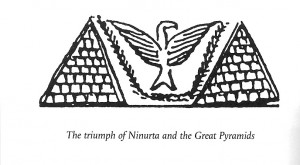 (Ninurta defeats Marduk in the war over pyramids)
(Ninurta defeats Marduk in the war over pyramids)
Hero whose awesomeness covers the Mountains like a south storm;
Ninurta, who makes the good tiara, the rainbow (?), flash like lightning;
grandly begotten by him who wears the princely beard; dragon who turns on himself,
strength of a lion snarling at a snake, roaring hurricane; Ninurta, King, whom Enlil has exalted above himself;
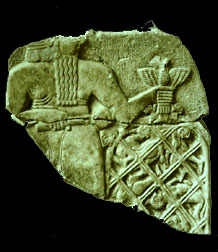 (Ninurta captures earthlings in his alien high-tech battle net, Anzu in his grasp)
(Ninurta captures earthlings in his alien high-tech battle net, Anzu in his grasp)
Hero, great battle-net flung over the foe; Ninurta, with the awesomeness of your shadow
extending over the Land; releasing fury on the rebel lands, overwhelming their assemblies!
Ninurta, King, son who has forced homage to his father far and wide!
(King and Hero are titles of Ninurta)
17-23 Inspiring great numinous power, he had taken his place on the throne, the august dais,
and was sitting gladly at his ease at the festival celebrated in his honor, rivaling An and Enlil in drinking his fill,
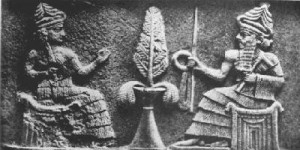 (Bau & her nephew-spouse Ninurta)
(Bau & her nephew-spouse Ninurta)
while Bau (Ninurta‘s spouse) was pleading petitions in a prayer for the king,
and he, Ninurta, Enlil‘s son, was handing down decisions.
At that moment the Lord’s battle-mace looked towards the Mountains,
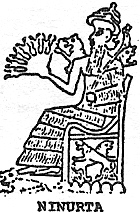 (Ninurta, Enlil‘s son & heir, born of the “double seed”, with alien weaponry technologies)
(Ninurta, Enlil‘s son & heir, born of the “double seed”, with alien weaponry technologies)
the Car-ur (Ninurta‘s weapon? /general?) cried out aloud to its master:
24-47 ” Lord of lofty station, foremost one, who presides over all lords from the throne dais,
Ninurta, whose orders are unalterable, whose decisions are faithfully executed; my master!
Heaven copulated with the verdant Earth, Ninurta: she has born him a warrior who knows no fear —
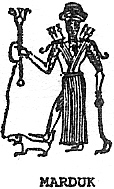
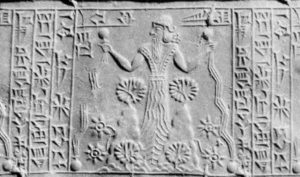 (Enki‘s eldest son Marduk, the Asag, enemy of Enlil & Ninurta,, displeased with Enlil‘s rule under “double-seed” law of succession)
(Enki‘s eldest son Marduk, the Asag, enemy of Enlil & Ninurta,, displeased with Enlil‘s rule under “double-seed” law of succession)
the Asag (Marduk), a child who sucked the power of milk without ever staying with a wet-nurse, a foster-child,
O my master — knowing no father, a murderer from the Mountains, a youth who has come forth from ……,
whose face knows no shame; impudent of eye, an arrogant male,
Ninurta (1 ms. has instead: Ninjirsu), rejoicing in his stature.
My Hero, you who are like a bull, I will take my stand beside you.
My master, who turns sympathetically towards his own city, who is effective in carrying out his mother’s wishes:
it has sired offspring in the Mountains, and spread its seeds far and wide.
The plants have unanimously named it king over them; like a great wild bull, it tosses its horns amongst them.
The cu, the sajkal, the esi (diorite), the usium, the kagina (haematite), and the heroic nu stones,
its warriors, constantly come raiding the cities.
For them a shark’s tooth has grown up in the Mountains; it has stripped the trees.
Before its might the gods of those cities bow towards it.
My master, this same creature has erected a throne dais: it is not lying idle.
Ninurta, Lord, it actually decides the Land’s lawsuits, just as you do.
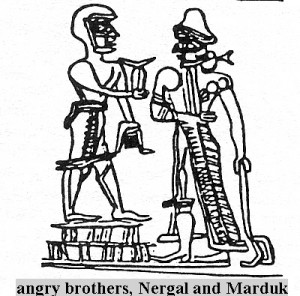 (high-priest upon temple / ziggurat, & Marduk, prepared for battle)
(high-priest upon temple / ziggurat, & Marduk, prepared for battle)
Who can compass the Asag‘s (Marduk‘s) dread glory?
Who can counteract the severity of its frown?
People are terrified, fear makes the flesh creep; their eyes are fixed upon it.
My master, the Mountains have taken their offerings to it.”
48-56 ” Hero! They have appealed to you, because of your father; son of Enlil,
Lord, because of your superior strength they are looking to you here; since you are strong, my master,
they are calling for your help, saying, Ninurta, that not a single warrior counts except for you!
They wanted to advise you about …….
Hero, there have been consultations with a view to taking away your kingship.
Ninurta, it is confident that it can lay hands on the powers received by you in the abzu (Enki‘s domain).
Its face is deformed, its location is continually changing;
day by day, the Asag (Enki‘s son Marduk) adds territories to its domain.”
57-69 “But you will force it into the shackles of the gods.
You, Antelope of Heaven, must trample the Mountains beneath your hooves, Ninurta, Lord, son of Enlil.
Who has so far been able to resist its assault?
The besetting Asag is beyond all control, its weight is too heavy.
Rumors of its armies constantly arrive, before ever its soldiers are seen.
This thing’s strength is massive, no weapon has been able to overturn it.
Ninurta, neither the ax nor the all-powerful spear can penetrate its flesh,
no warrior like it has ever been created against you.
Lord, you who reach out towards the august divine powers (alien technologies), splendor,
jewel of the gods, you bull with the features of a wild bull, with a prominent backbone, …… this fellow is clever!
My Ninurta, whose form Enki contemplates with favor, my Uta-ulu (Ninurta), Lord, son of Enlil, what is to be done?
70-95 The Lord cried “Alas!” so that Heaven trembled, and Earth huddled at his feet and was terrified (?) at his strength.
Enlil became confused and went out of the E-kur.
(giant alien gods battling each other with mountain-destroying alien weapons, cousins vs. cousins)
The Mountains were devastated.
That day the earth became dark, the Anuna trembled.
The Hero beat his thighs with his fists.
The gods dispersed; the Anuna (Anunnaki) disappeared over the horizon like sheep.
The Lord arose, touching the sky; Ninurta went to battle, with one step (?) he covered a league,
he was an alarming storm, and rode on the eight winds towards the rebel lands.
His arms grasped the lance.
The mace snarled at the Mountains, the club began to devour all the enemy.
 (Ninurta with advanced hi-tech alien weaponry earthlings could not defend or understand)
(Ninurta with advanced hi-tech alien weaponry earthlings could not defend or understand)
He fitted the evil wind and the sirocco on a pole (?), he placed the quiver on its hook (?).
An enormous hurricane, irresistible, went before the Hero, stirred up the dust,
caused the dust to settle, leveled high and low, filled the holes.
It caused a rain of coals and flaming fires; the fire consumed men.
It overturned tall trees by their trunks, reducing the forests to heaps,
Earth put her hands on her heart and cried harrowingly; the Tigris was muddied, disturbed, cloudy, stirred up.
He hurried to battle on the boat Ma-kar-nunta-eda;
the people there did not know where to turn, they bumped into (?) the walls.
The birds there tried to lift their heads to fly away, but their wings trailed on the ground.
The storm flooded out the fish there in the subterranean waters, their mouths snapped at the air.
It reduced the animals of the open country to firewood, roasting them like locusts. (alien nuclear technologies)
It was a deluge rising and disastrously ruining the Mountains.
96-118 The Hero Ninurta led the march through the rebel lands.
He killed their messengers in the Mountains, he crushed (?) their cities,
he smote their cowherds over the head like fluttering butterflies,
he tied together their hands with hirin grass, so that they dashed their heads against walls.
The lights of the Mountains did not gleam in the distance any longer.
People gasped for breath (?); those people were ill,
they hugged themselves, they cursed the Earth, they considered the day of the Asag‘s birth a day of disaster.
The Lord caused bilious poison to run over the rebel lands.
As he went the gall followed, anger filled his heart, and he rose like a river in spate and engulfed all the enemies.
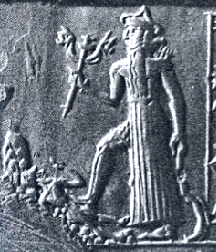 (Nergal in the Under World with his dual-lion-headed alien high-tech weaponry & foot upon disloyal earthling)
(Nergal in the Under World with his dual-lion-headed alien high-tech weaponry & foot upon disloyal earthling)
In his heart he beamed at his lion-headed weapon,
as it flew up like a bird (alien high technologies), trampling the Mountains for him.
It raised itself on its wings to take away prisoner the disobedient,
it spun around the horizon of heaven to find out what was happening.
Someone from afar came to meet it, brought news for the tireless one, the one who never rests,
 (armed disc with terrible weapons)
(armed disc with terrible weapons)
whose wings bear the deluge, the Car-ur.
What did it gather there …… for Lord Ninurta?
It reported the deliberations of the Mountains,
it explained their intentions to Lord Ninurta, it outlined (?) what people were saying about the Asag.
119-121 “Hero, beware!” it said concernedly.
The weapon embraced him whom it loved, the Car-ur (general / pilot / weapon?) addressed Lord Ninurta:
122-134 “Hero, pitfall (?), net of battle, Ninurta, King, celestial mace …… irresistible against the enemy,
vigorous one, tempest which rages against the rebel lands, wave which submerges the harvest,
King, you have looked on battles, you have …… in the thick of them.
Ninurta, after gathering the enemy in a battle-net, after erecting a great reed-altar,
Lord, heavenly serpent, purify your pickaxe and your mace!
Ninurta, I will enumerate the names of the warriors you have already slain:
the Kuli-ana, the Dragon, Gypsum, the Strong Copper, the hero Six-headed Wild Ram, the Magilum boat,
Lord Saman-ana, the Bison bull, the Palm-tree King, the Anzud bird, the Seven-headed Snake —
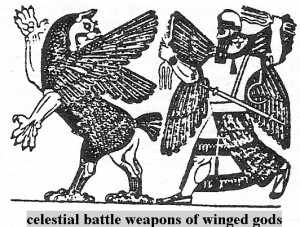 (Ninurta stops the Igigi leader Anzu‘s coup against Enlil)
(Ninurta stops the Igigi leader Anzu‘s coup against Enlil)
Ninurta, you slew them in the Mountains.”
135-150 ” But Lord, do not venture again to a battle as terrible as that.
Do not lift your arm to the smiting of weapons, to the festival of the young men, to Inanna‘s dance!
Lord, do not go to such a great battle as this!
Do not hurry; fix your feet on the ground.
Ninurta, the Asag is waiting for you in the Mountains.
Hero who is so handsome in his crown, firstborn son (of Ninhursag & her 1/2 brother Enlil)
whom Ninlil has decorated with numberless charms, good Lord, whom a princess bore to an en priest,
Hero who wears horns like the moon, who is long life for the king of the Land,
who opens the sky by great sublime strength, inundation who engulfs the banks ……,
Ninurta, Lord, full of fearsomeness, who will hurry towards the Mountains,
proud Hero without fellow, this time you will not equal the Asag!
Ninurta, do not make your young men enter the Mountains.”
151-167 The Hero, the son, pride of his father, the very wise, rising from profound deliberation,
Ninurta, the Lord, the son of Enlil, gifted with broad wisdom, the …… god,
the Lord stretched his leg to mount the onager, and joined the battalions …….
He spread over the Mountains his great long ……, he caused …… to go out among its people like the …….
He reached …….
He went into the rebel lands in the vanguard of the battle.
He gave orders to his lance, and attached it …… by its cord; the Lord commanded his mace, and it went to its belt.
The Hero hastened to the battle, he …… heaven and earth.
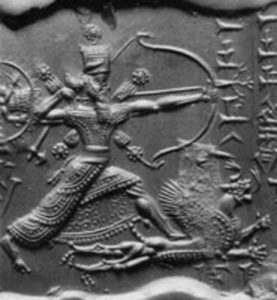 (Ninurta atop his winged beast / sky-disc, loaded with alien misunderstood weaponry)
(Ninurta atop his winged beast / sky-disc, loaded with alien misunderstood weaponry)
He prepared the throw-stick and the shield,
the Mountains were smitten and cringed beside the battle legions of Ninurta.
When the hero was girding on his mace, the sun did not wait, the moon went in;
they were forgotten, as he marched towards the Mountains; the day became like pitch.
168-186 The Asag leapt up at the head of the battle.
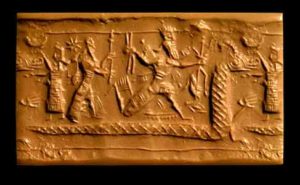 (Nabu, & father Marduk vrs. Ninurta, Inanna, etc.)
(Nabu, & father Marduk vrs. Ninurta, Inanna, etc.)
For a club it uprooted the sky, took it in its hand; like a snake it slid its head along the ground.
It was a mad dog attacking to kill the helpless, dripping with sweat on its flanks.
Like a wall collapsing, the Asag fell on Ninurta the son (& heir) of Enlil.
Like an accursed storm, it howled in a raucous voice; like a gigantic snake, it roared at the Land.
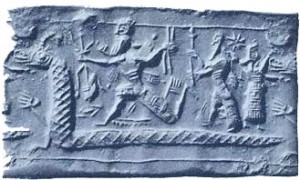 (Marduk rides his dragon snake symbol, son Nabu, & Ninhursag)
(Marduk rides his dragon snake symbol, son Nabu, & Ninhursag)
It dried up the waters of the Mountains, dragged away the tamarisks,
tore the flesh of the Earth and covered her with painful wounds.
It set fire to the reed-beds, bathed the sky in blood, turned it inside out; it dispersed the people there.
At that moment, on that day, the fields became black potash,
across the whole extent of the horizon, reddish like purple dye —
truly it was so! (nuclear war, Ninurta & Nergal vs. Marduk and Nabu)
An (Anu) was overwhelmed, crouched, wrung his hands against his stomach;
Enlil groaned and hid himself in a corner, the Anuna flattened themselves against walls,
the house was full of fearful sighing as of pigeons.
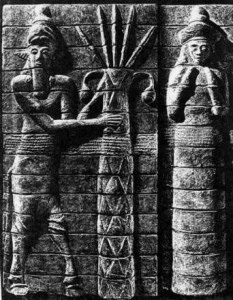 (Enlil & equal spouse Ninlil carved into ancient city wall)
(Enlil & equal spouse Ninlil carved into ancient city wall)
The Great Mountain Enlil cried to Ninlil:
187-190 “My wife, my son is no longer here; what is there to support me?
The Lord, the authority of the E-kur, the King who imposes the strong shackle for his father,
a cedar rooted in the abzu, a crown with broad shade,
my son, my security — he is not here any more: who will take me by the hand?”
191-214 The weapon which loved the Lord, obedient to its master,
the Car-ur .….. for Lord Ninurta to his father in Nibru …….
The awesome splendor enveloped Ninurta like a garment, ……. …… bound him: therefore the Lord …….
The weapon …… spoke to Enlil.
215-224 “…… Ninurta, having confidence in himself; …… he will be standing;
the waters will be dried up as if by the sun’s heat; …… he will breathe again, he will be standing full of joy.
I shall cause horrid storms to rise against …… of the Hero Ninurta …….
…… as for him who resisted (?) the Mountains, he has been amazed by his strength.
Now I shall give my orders, you are to follow these instructions:
1 line unclear
…… in the fields, let him not diminish the population.
…… let him not cause a lack of posterity.
Let him not cause to perish the name of all the kinds of species (alien weapons)
whose destinies I, Enlil, have decreed.”
225-227 The weapon, its heart ……, was reassured:
it slapped its thighs, the Car-ur began to run,
it entered the rebel lands, joyfully it reported the message to Lord Ninurta:
228-243 “My master, …… for you, Enlil has said:
“As the Deluge i.e. Ninurta, before whom the venom has piled up, attacks the enemy,
let him take the Asag by the shoulder, let him pierce its liver, let my son enter with it into the E-kur.
(Enlil, Ninurta, & Inanna, armed with alien weaponry & prepared for battle)
Then, Ninurta, to the limits of the earth my people will deservedly praise your power.”
You, Lord who trusts in the word of his father, do not tarry, great strength of Enlil.
Storm of the rebel lands, who grinds the Mountains like flour, Ninurta, Enlil‘s seal-bearer, go to it!
Do not tarry. My master: the Asag has constructed a wall of stakes on an earthen rampart;
the fortress is too high and cannot be reached, …… its fierceness does not diminish.
3 lines unclear
My master, …….”
244-251 Ninurta opened his mouth to speak to the mace …….
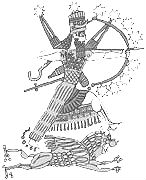 (Ninurta, son & heir to Enlil, King Anu‘s royal heir descendants)
(Ninurta, son & heir to Enlil, King Anu‘s royal heir descendants)
He aimed the lance at the Mountains …….
The Lord stretched out an arm towards the clouds.
Day became a dark night.
He yelled like a storm, …….
2 lines unclear
251-264 The Lord …… clouds of dust.
In his battle he smote the Mountains with a cudgel.
The Car-ur made the storm-wind rise to heaven, scattering the people; like …… it tore.
Its venom alone destroyed the townspeople.
The destructive mace set fire to the Mountains, the murderous weapon smashed skulls with its painful teeth,
the club which tears out entrails gnashed its teeth.
The lance was stuck into the ground and the crevasses filled with blood.
In the rebel lands dogs licked it up like milk.
The enemy rose up, crying to wife and child,
“You did not lift your arms in prayer to Lord Ninurta“.
The weapon (alien technology) covered the Mountains with dust, but did not shake the heart of the Asag.
The Car-ur threw its arms around the neck of the Lord:
265-280 ” Hero, ah, what further awaits you?
Do not on any account meddle with the hurricane of the Mountains.
Ninurta, Lord, son of Enlil, I tell you again, it is made like a storm.
It is a blister whose smell is foul, like mucus which comes from the nose it is unpleasant,
Lord, its words are devious, it will not obey you.
My master, it has been created against you as a god; who can help you?
Hero, it falls on the land as a whirlwind, it scrubs it as if with saltwort,
Ninurta, it chases the onagers before it in the Mountains.
Its terrifying splendor sends the dust into clouds, it causes a downpour of potsherds (alien nuclear technology).
In the rebel lands it is a lion striking with savage teeth; no man can catch it.
After reducing everything to nothing in the north wind, it …….
The sheepfolds have been closed by ghostly demons.
It has dried up the waters in the ground.
In the whirlwind storm, the people are finished, they have no solution (?).
From an implacable enemy, great Hero, Lord, turn away,” he said quietly.
281-299 But the Lord howled at the Mountains, could not withhold a roar.
The Hero did not address the rebel lands, he …….
He reversed the evil that it had done …….
He smashed the heads of all the enemies, he made the Mountains weep.
The Lord ranged about in all directions, like a soldier saying “I will go on the rampage”.
Like a bird of prey the Asag looked up angrily from the Mountains.
He commanded the rebel lands to be silent and …….
Ninurta approached the enemy and flattened him like a wave (?).
The Asag‘s terrifying splendor was contained, it began to fade, it began to fade.
It looked wonderingly upwards.
Like water he agitated it, he scattered it into the Mountains, like weeds he pulled it up, like rushes he ripped it up.
Ninurta‘s splendor covered the Land, he pounded the Asag like roasted barley,
he …… its genitals (?), he piled it up like a heap of broken bricks,
he heaped it up like flour, as a potter does with coals; he piled it up like stamped earth whose mud is being stirred.
The Hero had achieved his heart’s desire.
Ninurta, the Lord, the son of Enlil, …… began to calm down.
300-309 In the Mountains, the day came to an end.
The sun bade it farewell.
The Lord …… his belt and mace in water, he washed the blood from his clothes,
the Hero wiped his brow, he made a victory-chant over the dead body.
When he had brought the Asag which he had slain (Marduk lived on)
to the condition of a ship wrecked by a tidal wave, the gods of the Land came to him.
Like exhausted wild asses they prostrated themselves before him, and for this Lord,
because of his proud conduct, for Ninurta, the son of Enlil, they clapped their hands in greeting.
The Car-ur addressed these flattering words aloud to its master (1 ms. has instead: to Lord Ninurta):
310-330 “Lord, great mec tree in a watered field,
Hero, who is like you?
My master, beside you there is no one else, nor can anyone stand like you, nor is anyone born like you.
Ninurta, from today no one in the Mountains will rise against you.
My master, if you give but one roar, …… how they will praise you!
1 line unclear
Lord Ninurta…….”
7 lines damaged
After he had pulled up the Asag like a weed in the rebel lands, torn it up like a rush, Lord Ninurta…… his club:
1 line unclear
“From today forward, do not say Asag: its name shall be Stone.
Its name shall be zalag stone, its name shall be Stone.
This, its entrails, shall be the underworld.
Its valor shall belong to the Lord.”
331-333 The blessing of the club, laid to rest in a corner: “The mighty battle which reduces the Land”.
1 line missing
334-346 At that time, the good water coming forth from the earth did not pour down over the fields.
The cold water (?) was piled up everywhere, and the day when it began to ……
it brought destruction in the Mountains, since the gods of the Land were subject to servitude,
(a time in our forgotten past, when the gods did the work; earthling worker-king carries the load)
and had to carry the hoe and the basket –– this was their corvée work —
people called on a household for the recruitment of workers.
The Tigris did not bring up its flood in its fullness.
Its mouth did not finish in the sea, it did not carry fresh water.
No one brought (?) offerings to the market.
The famine was hard, as nothing had yet been born.
No one yet cleaned the little canals, the mud was not dredged up.
Ditch-making did not yet exist.
People did not work (?) in furrows, barley was sown broadcast.
347-359 The Lord applied his great wisdom to it.
Ninurta (1 ms. has instead: Ninjirsu), the son (& heir) of Enlil, set about it in a grand way.
He made a pile of stones in the Mountains.
Like a floating cloud he stretched out his arms over it.
With a great wall he barred the front of the Land.
He installed a sluice (?) on the horizon.
The Hero acted cleverly, he dammed in the cities together.
He blocked (?) the powerful waters by means of stones.
Now the waters will never again go down from the Mountains into the earth.
That which was dispersed he gathered together.
Where in the Mountains scattered lakes had formed, he joined them all together and led them down to the Tigris.
He poured carp-floods of water over the fields.
360-367 Now, today, throughout the whole world, kings of the Land far and wide rejoice at Lord Ninurta.
He provided water for the speckled barley in the cultivated fields,
he raised up (2 mss. have instead: piled up) the harvest of fruits in garden and orchard.
He heaped up the grain piles like mounds.
The Lord caused trading colonies to go up from the Land of Sumer.
He contented the desires of the gods.
They duly praised Ninurta‘s father.
368-371 At that time he also reached a woman with compassion.
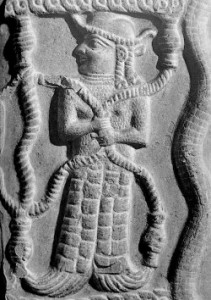 (Ninhursag, King Anu‘s daughter Enlil‘s 1/2 sister, Enki‘s sister)
(Ninhursag, King Anu‘s daughter Enlil‘s 1/2 sister, Enki‘s sister)
Ninmah (Ninhursag, his mother) was sleepless from remembering the place where she had conceived him.
She covered her outside with a fleece, like an unshorn ewe, she made a great lament about the now inaccessible Mountains:
372-386 “The Mountains could not bear the Lord’s great strength.
The great Hero — the force of whose rage no one can approach,
like heaven itself; the savage storm which walks on earth, spilling poison in the earth’s breast;
the Lord, the life-breath of Enlil, whose head is worthy of the tiara, ……
who knows nothing of ……: in triumph he hurried by me, he with whom my husband made me pregnant (?).
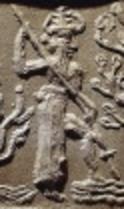 (Enlil, Anu‘s son & heir, Earth Colony Commander, father to loyal warrior Ninurta)
(Enlil, Anu‘s son & heir, Earth Colony Commander, father to loyal warrior Ninurta)
I bore him for my husband (1 /2 brother Enlil).
He was close ……; but the son of Enlil passed by and did not lift his glance to me.
For the good youth” — thus the good lady said, as she went to him in E-cumeca, his chosen place, –
” I will cut the knot. Now I, yes I, shall go to the presumptuous Lord, to gaze upon the precious Lord.
I will go directly to him, to my son, Enlil‘s judge, the great Hero, favored by his father.”
387-389 The lady performed the song in a holy manner.
Ninmah recited it to Lord Ninurta.
He looked at her with his life-giving looks and spoke to her:
(Ninurta, Ninhursag, & Inanna; Ninhursag cannot discourage them from war)
390-410 “Lady, since you came to the Mountains, Ninmah (Ninhursag) (‘Great Lady’),
since you entered the rebel lands for my sake, since you did not keep far from me
when I was surrounded by the horrors of battle — let the name of the pile which I, the Hero,
have piled up be Mountain (hursaj) and may you be its lady (nin): now that is the destiny decreed by Ninurta.
Henceforth people shall speak of Ninhursaja (Ninhursag).
So be it.
Let its meadows produce herbs for you.
Let its slopes produce honey and wine for you.
Let its hillsides grow cedars, cypress, juniper and box for you.
Let it make abundant for you ripe fruits, as a garden.
Let the mountain supply you richly with divine perfumes.
Let it mine gold and silver for you, make …… for you.
Let it smelt copper and tin for you, make its tribute for you.
Let the Mountains make wild animals teem for you.
Let the mountain increase the fecundity of quadrupeds for you.
You, o Queen, become equal to An, wearing a terrifying splendor.
Great goddess who detests boasting, good lady, maiden Ninhursaja,
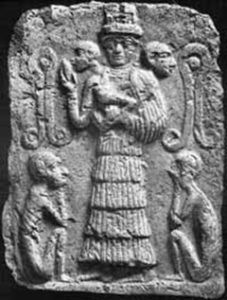 (Ninhursag with her early attempts of fashioning replacement workers for the gods)
(Ninhursag with her early attempts of fashioning replacement workers for the gods)
Nintud (Ninhursag), …… approach me.
Lady, I have given you great powers: may you be exalted.”
411-413 While the Lord was fixing the destiny of the Mountains,
as he walked about in the sanctuary of Nibru, the good lady whose powers excel all powers (DNA technologies),
Lady-creatrix-of-the-womb, Aruru (Ninhursag), Enlil‘s elder sister, stood before him:
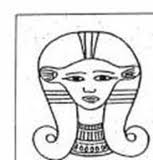
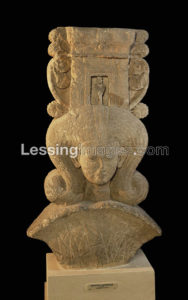 (Ninhursag, Chief Medical Scientist & DNA specialist)
(Ninhursag, Chief Medical Scientist & DNA specialist)
414-415 “Great Hero whose word like that of his father is unalterable,
Lord: you have not fixed the destinies of the warriors that you have slain.”
416-418 The Lord then addressed the u stone.
He defined (?) its typical behavior.
The Lord spoke to it in anger in the Land, Ninurta son of Enlil cursed it:
419-434 “U stone (emery), since you rose against me in the Mountains,
since you barred the way (2 mss. have instead: seized me) so as to detain me,
since you swore to put me to death, since you frightened me, Lord Ninurta, on my great throne;
you are powerful, a youth of outstanding strength: may your size be diminished.
A mighty lion, confident in its strength, will tear you into pieces,
the strong man will fling you in his hand in combat (1 ms. has instead: for strength).
Young u stone, your brothers will heap you up like flour.
You will lift your hand against your offspring, sink your teeth into their corpses.
You, young man, though you may cry out, will end as …….
Like a great wild bull killed by many people, be divided into portions.
U stone, you will be hounded from the battlefield with clubs, like a dog chased by shepherd boys.
Because I am the Lord: since cornelian is polished by you, you shall be called by its name.
And now, according to the destiny fixed by Ninurta, henceforth when u stone touches it, there will be pierced cornelian.
Let it be so.”
435-437 The Hero addressed the cu and gasura stones.
The Lord enumerated their characteristics.
Ninurta son of Enlil fixed their destiny:
438-447 “Cu stones, since you attacked against my weapons;
gasura stones, since you stood fiercely against me like bulls,
since you tossed (?) your horns in the dust at me like wild bulls, you shall be …… like butterflies.
My terrifying splendor will cover you.
Since you cannot escape from my (1 ms. has instead: his) great strength,
the goldsmith shall puff and blow on you with his breath.
You shall be shaped by him to form a matrix for his creations.
People shall place the first fruits of the gods on you at the time of the new moon.”
448-450 My King stood before the sajkal stone, he addressed the gulgul and sajjar stones. (alien technologies)
Ninurta son of Enlil fixed their destiny:
451-462 “Sajkal stone, since you flew up against me ……; gulgul stone,
since you sparked lightning against me ……; sajjar stone,
since you shook your head at me, since you ground your teeth at me, the Lord!
The sajkal stone will smash you, sajjar stone, young brave, and the gulgul stone will destroy (gul) you.
You will be discarded as contemptible and valueless (saj nukala).
Be a prey to the famine (cagjar) of the Land; you shall be fed by the charity of your city.
You shall be accounted a common person, a warrior among slave-girls.
They shall say to you “Be off with you, hurry!”, it shall be your name.
And now, by the destiny fixed by Ninurta, henceforth you shall be called a bad lot in the Land.
So be it.”
463-465 My King stood before the esi stone.
…… he spoke in hymnic language.
Ninurta son of Enlil fixed its destiny:
466-478 “Esi (diorite), your army in battle changed sides separately (?).
You spread before me like thick smoke.
You did not raise your hand.
You did not attack me.
Since you said, “It is false.
The Lord is alone the Hero.
Who can vie with Ninurta, son of Enlil?” — they shall extract you from the highland countries.
They shall bring (?) you from the land of Magan (Egypt).
You shall shape (?) Strong Copper like leather
and then you shall be perfectly adapted for my heroic arm, for me, the Lord.
When a king who is establishing his renown for perpetuity has had its statues sculpted for all time,
you shall be placed in the place of libations — and it shall suit you well — in my temple E-ninnu, the house full of grace.”
479-481 My King turned to the na stone.
He …… the body from the na stone.
Ninurta son of Enlil cursed it:
482-486 “Stone, since you said, “If only it had been me”;
na stones, since you bewitched my powers — lie down there, you, to be worked on like a pig.
Be discarded, be used for nothing, end up by being reduced to tiny fragments.
He who knows you shall reduce you to liquid.”
487-488 My King turned to the elel stone.
Ninurta son of Enlil fixed its destiny:
489-496 “Elel, intelligently you caused terror of me
to descend on the Mountains where discord had broken out.
In the rebel lands you proclaimed my name among my people who had banded together.
Nothing of your wholeness shall be diminished (?).
It shall be difficult to reduce your mass to small pieces.
My divine ordinances shall be set out in straight lines on your body.
You shall be greatly suited to the clash of weapons, when I have heroes to slay.
You shall be set up on a pedestal in my great courtyard.
The Land shall praise you in wonder, the foreign lands shall speak your praises (2 mss. have instead: elevate you).”
497-499 The Hero turned to the kagina (haematite) stone, he addressed it for its hardness.
Ninurta son of Enlil fixed its destiny:
500-511 “Young man worthy of respect, whose surface reflects the light,
kagina, when the demands of the rebel lands reached you, I did not conquer you …….
I did not notice you among the hostile ones.
I shall make room for you in the Land.
The divine rites of Utu shall become your powers.
Be constituted as a judge in the foreign lands.
The craftsman, expert in everything, shall value you as if gold.
Young man of whom I have taken possession, because of you I shall not sleep until you come to life.
And now, according to the destiny fixed by Ninurta, henceforth kagina shall live! So shall it be.”
512-513 The Hero stood before the jicnugal (alabaster) stone.
Ninurta son of Enlil fixed its destiny:
514-521 “icnu, whose body shines like the daylight!
Purified silver, youth destined for the palace, since you alone held out your hands to me,
and you prostrated yourself before me in your Mountains,
I did not smite you with the club, and I did not turn my strength against you.
Hero, you stood firm by me when I yelled out.
Your name shall be called benevolence.
The treasury of the Land shall be subject to your hand, you shall be its seal-keeper.
(1 ms. adds the line: The Anuna…….)”
522-524 My King turned to the algamec stone and frowned.
The Lord spoke to it angrily in the Land.
Ninurta son of Enlil cursed it:
525-527 “What provision did you make to assist my progress?
Be the first to go into my forge.
Algamec, you shall be the regular sacrifice offered daily by the smiths.”
528-533 My King turned to the ducia stone.
He addressed the nir, the gug (cornelian) and the zagin (lapis lazuli);
the amac-pa-ed, the caba, the hurizum, the gug-gazi and the marhali;
the egi-zaga, the girin-hiliba, the anzugulme and the nir-mucjir stones
(1 ms.: the …… and the gazi-musud stones).
The Lord Ninurta, son of Enlil, fixed their destinies for …… the waterskin:
534-542 “How you came to my side, male and female in form, and in your own way!
You committed no fault, and you supported me with strength.
You exalted me in public.
Now in my deliberation, I shall exalt you.
Since you made yourself general of the assembly, you, nir, shall be chosen for syrup and for wine.
You shall all be decorated with precious metal.
The principal among the gods shall cause the foreign lands
to prostrate themselves before you, putting their noses to the ground.”
543-545 My King turned to the jir-zu-jal (flint), and frowned.
The Lord spoke to it angrily in the Land.
Ninurta son of Enlil cursed it:
546-553 “Ah, duplicitous jir-zu-jal, what then?
They shall split your horns, wild bull, in your Mountains.
Lie down before the …….
You were not equal to me who supported you.
I shall rip you like a sack, and people will smash you into tiny pieces.
The metalworker shall deal with you, he shall use his chisel on you.
Young man, massive, bearer of hatred: the carpenter, saying “I wish to buy it for my work”,
shall wet you with water …… and shall crush you like malt.”
554-556 My King turned to the iman stones, he addressed the alliga stones.
Ninurta son of Enlil fixed their destiny:
557-565 “Iman stones, in the Mountains you cried out against me.
You fiercely uttered battle-yells. I shall enflame you like fire.
Like a storm I shall overturn you. I shall strip you like rushes.
I shall rip you up like weeds. Who will assist you then?
Iman stone: your cries shall not be valued, no attention shall be paid to them.
Iman stone, alliga stone: your path shall not lead to the palace.”
566-568 My King turned to the macda stone.
He addressed the dubban and urutum stones.
Ninurta son of Enlil defined (?) their characteristic behavior:
569-578 “Macda stone, dubban stone, blazing fires; urutum stone, which nothing resists;
when the gasura stone …… and you were set ablaze, you burnt against me in the rebel lands like a brazier.
Since you all stood against me in the land of Saba: macda stone, they shall slaughter you like a sheep.
Dubban stone, they shall crunch you for pulverizing.
Urutum stone, they shall sharpen you for the battle-mace;
with bronze, the arrowheads of the gods, they shall smash you with the ax, stinging with fierce swords.”
579-580 My King turned to the cagara stone.
Ninurta son of Enlil fixed its destiny:
581-591 “Cagara stone, who smash (?) your head against anyone traveling alone in the desert,
in the Mountains when my arms were occupied you tried to trample on me.
Since you glutted yourself in the battle, the reed-worker shall make the reeds jump with you.
You shall be thrown onto your couch; the appearance (?)
of your mother and father who bore you shall be forgotten (?).
No one shall say to you, “Get up”, no one shall have the feeling that he misses you,
the people shall not complain about your loss.
In praise of the eternally-created powers in Ninhursaja‘s (Ninhursag‘s) resting place,
you shall be discarded on the dais there.
They shall feed you on malt, as they do for sheep; you shall content yourself with a portion of scattered flour.
This shall be the explanation for you.”
592-593 My King turned to the marhuca stone, Ninurta the son of Enlil pronounced its destiny.
594-599 “Marhuca, …… the string in my place, …… you were taken,
since you did not participate in the crimes of your city, ……;
you shall be the bowl under the filter-jug, the water shall filter into you.
Marhusa, you shall be used for inlay-work, …….
You shall be the perfect ornament for sacred brooches.
Marhuca, you shall be duly praised in the temples of the gods.”
600-602 The Hero turned to the hactum stone and frowned.
In the Land the Lord addressed it angrily; Ninurta the son of Enlil pronounced its destiny:
603-608 “Hactum stone, you cried out against me in the Mountains.
You yelled fiercely with wild battle-yells.
With your yelling, you fixed a lila demon in the Mountains.
Young man, because of your digging,
Ditch (hactum) shall be your name.
And now, according to the destiny of Ninurta, henceforth they shall say hactum.
So be it.”
609-610 My King turned to the durul stone.
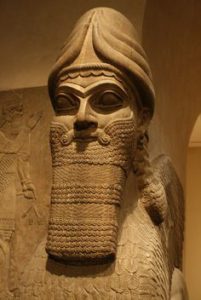 (Royal Prince Ninurta, son & heir to Enlil)
(Royal Prince Ninurta, son & heir to Enlil)
Ninurta son of Enlil fixed its destiny:
611-617 “Durul stone, holy garment of mourning, blinded youth whom people carve,
in the Mountains you prostrated yourself before me.
Since you said to me, “If only it had been me who broke the bars of the gates,
if only I had stood before him, before my King, Lord Ninurta“,
your name shall be magnified of its own accord wherever it is mentioned.
As the connoisseur says of precious metal, “I will buy it”, so the foreign nations,
like musicians playing the reed-pipe, shall pursue you.”
618-633 My King turned to the cigcig stone, he addressed the engen and ezinum stones.
For the ug-gun, the hem, the madanum, the sajgirmud, the …… and the mursuh stones,
Ninurta son of Enlil fixed their destiny:
2 lines unclear
“with ribs drawn in, balancing on the haunches, heart elated, legs bent like a bear, ……:
I shall come to you; now, being an ally, you come forward from all of them; who shall extend the hand to them?
You were the club, you stood as the doorway.
3 lines unclear
In the Land, the champion shall always look (?) with favor on you.”
634-637 The Hero turned to the kurgaranum stone.
He addressed the bal stone; the Lord Ninurta, son of Enlil, fixed the destiny for the yellow-colored cimbi (kohl):
638-644 “Since you said, “I will bring forth the people”,
1 line unclear
you …… as if …… the young man who has obtained (?) glory for you; the young artisan shall sing your praises.
You shall be favored for the festival of spirits of the dead;
on the ninth day of the month, at the new moon, the young men shall …… for you.”
He assigned …… them to the cult of Ninhursaja.
645-651 The Hero had conquered the Mountains.
As he moved across the desert, he …….
Through the crowd, he came forth among their acclamations (?), majestically he …….
Ninurta joyfully went to his beloved barge, the Lord set foot in the boat Ma-kar-nunta-eda.
The boatmen sang a pleasant song, for the Lord they sang his praise.
They addressed an eternal greeting to Ninurta son of Enlil:
652-661 “God who outstrips the heroes,
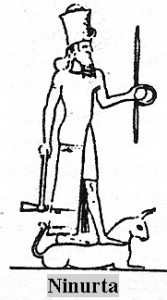 (Ninurta with royal scepter & alien weaponry)
(Ninurta with royal scepter & alien weaponry)
Lord Ninurta, king of the Anuna gods, holding a cudgel in his right hand,
bearded, you fall as a torrent on all enemies; who can rival your great works?
Hero, deluge, without equal, the enki and ninki deities do not dare to resist (?) you.
Hero who pillages the cities, who subjugates the Mountains, son of Enlil, who will rise up against you?
Ninurta, Lord, son of Enlil, Hero, who is like you?
662-668 “My King: there is a hero who is devoted to you and to your offerings,
he is as just as his reputation, he walks in your ways;
since he has brilliantly accomplished all that is proper for you in your temple,
since he has made your shrine rise from the dust for you, let him do everything magnificently for your festival.
Let him accomplish perfectly for you your holy rites.
He has formulated a vow for his life.
May he praise you in the Land.
669-671 “May An‘s heart be appeased for the Lord, may the maiden mother
(Ninurta & spouse Bau with her guard dog, 1st in taming & training dogs)
Bau (Ninurta‘s spouse) shine like the daylight for Ninurta, Enlil‘s strength.”
672-680 They sang to the Lord in the ceremonial (?) boat.
The boat, floating of its own accord, was piled up with riches.
The boat Ma-kar-nunta-eda proceeded shiningly.
To greet the Hero from the smiting of weapons, the Anuna…… came to meet him.
They pressed their noses to the ground, they placed their hands on their chests.
They addressed a prayer and a supplication to the Lord:
“May your anger be appeased ……. Ninurta, King, Utu-ulu (Ninurta), lift your head to heaven“.
681 His father Enlil blessed him:
682-697 “……, pre-eminent with your great name, you have established your habitation …….
Chest, fittingly ……, King of battle,
I presented the storm of heaven to you for use against the rebel lands.
O Hero of heaven and earth I presented to you the club, the deluge which sets the Mountains on fire.
King, ahead of your storm the way was narrow.
But, Ninurta, I had confidence in your march to the Mountains.
Like a wolf (?) set free to seize his prey, in your storm you adventured into the rebel lands from above.
The mountain that you have handed over shall not be restored.
You have caused its cities to be counted as ruin-mounds.
Its mighty rulers have lost their breath before you.
A celestial mace, a prosperous and unchanging rule, eternal life, the good favor of Enlil,
o King, and the strength of An: these shall be your reward.”
698-711 Since the Hero had killed (captured) the Asag, since the Lord had made that pile of stones,
since he had given the order “Let it be called stone”, since he had …… the roaring dragon,
since the Hero had traced the way of the waters …… down from above,
since he had brought them to the fertile fields, since he had made famous the plow of abundance,
since the Lord had established it in regular furrows,
since Ninurta son of Enlil had heaped up grain-piles and granaries —
Ninurta the son of Enlil entrusted their keeping to the care of the lady
who possesses the divine powers (alien technology) which exist of themselves,
who is eminently worthy of praise, to Nisaba (Ninlil‘s mother), good lady, greatly wise,
pre-eminent in the lands, her who possesses the principal tablet with the obligations of en and lugal,
endowed by Enki on the Holy Mound with a great intelligence.
712-723 To the lady, the celestial star, made magnificently beautiful by the prince in the abzu,
to the lady of knowledge who gladdens hearts, who alone has the gift of governing,
endowed with prudence, ……, who rules the black-headed, who possesses the tablet with all the names (?),
from whose suspended nets the birds which are caught do not escape,
whose every work accomplished meets with complete success, to her …… which is not unraveled,
to her for whom the days are counted according to the phases of the moon,
to her who is unassailable as if a fortress of copper ……, who is …… in counsels,
and wise in all manner of things, …… who cares for the black-headed, who rules the people justly,
……, the replica of Enlil, to the bright good lady who takes counsel with An (Anu) — to Nisaba be praise.
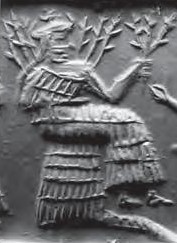 (Nisaba, Enlil‘s mother-in-law, Master Goddess of Scribes, Goddess of Grains)
(Nisaba, Enlil‘s mother-in-law, Master Goddess of Scribes, Goddess of Grains)
724-725 Enlil‘s mighty Lord, Ninurta, great son of the E-kur (Enlil‘s temple residence in Nippur),
heroic one of the father who bore him: it is good to praise you.
726 A cir-gid song of Ninurta
